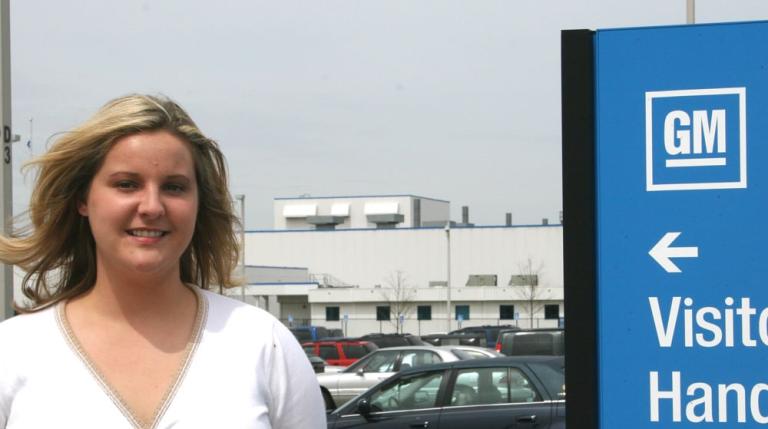
When your dad is a machine repairman for General Motors and a lot of your family work in auto manufacturing, it's not unusual to choose Kettering University for school and GM as a co-op job, but it is a little unusual to major in Environmental Chemistry.
Rachel Charron, of Nottingham, Maryland, did just that, and in the process, she got to be part of a team that turned one of Flint's GM facilities a lot greener - environmentally speaking. The project was to make the GM Powertrain Flint Engine South (GMPFES) facility in Flint landfill-free, meaning they would recycle, re-use or incinerate all waste from the facility, rather than put it in a landfill.
The project was started in 2004 by GM's environmental group. Charron joined the project in October of that year, as part of her regular co-op work rotation with GM. "I helped identify other waste streams to reduce the amount of material sent to the waste-to-energy facility," she said. A waste-to-energy facility is an incinerator that produces useable electrical energy by burning waste products.
"The stuff we dispose of at GM has a high BTU (British Thermal Unit) value," Charron said, "so it is better to get energy from it than just let it decompose underground."
One of the types of materials Charron worked with was absorbents. "For example, absorbent oil pads to pick up oil spills in the factory are made from 100 percent poly propylene fiber," she said. "I researched possible ways to re-use them by either laundering them or putting them in a centrifuge to get the oil out. In the end, it was determined the most effective way to handle the pads was to convert them from waste to energy by incineration," Charron said.
One of the products that can be recycled from the plant is roll filter media used to filter machine coolant so it can be re-used. The roll filter media are giant poly-olefin or cellulose rolls, that when recycled become a component in plastic wood alternative material used to make pallet risers. Other recyclable products from the plant include metal shavings, wood, scrap plastic, cardboard, batteries and office paper.
The GMPFES facility, which opened in 2001 and currently produces 4.2-liter, inline-6 engines, won the "We Care" award for 2005 from GM's Worldwide Facilities Group for the landfill-free project. "To our knowledge, we're the only plant in the Big Three that's landfill-free," said plant manager Steve Finch in a March 19, 2006, Flint Journal article.
"A total of 97 percent of all our waste is recycled," said Charron, "only three percent is sent to the waste-to-energy facility in Detroit. Most of the products sent to waste-to-energy include cafeteria waste, plastic, paper, used absorbents and personal protection equipment," she said. Averill Recycling, a Flint company, pre-sorts the materials before they are sent to the waste-to-energy facility.
And even though sending waste to the waste-to-energy facility isn't as cost effective as using a landfill, GM decided it was more environmentally friendly to do so, according to Charron. "GM is taking the stance that waste-to-energy is better than landfilling," she said.
Charron will continue her work as an Environmental Engineer with GM after graduation. She has been hired for a position at the company's Willow Run facility. Charron has been a co-op employee in General Motors' environmental division throughout her college career, working at six different facilities in Michigan, Ohio and Maryland.
"GM wants their environmental co-ops to be well rounded," said Charron to explain the diverse job locations. Her daily tasks include making sure the plants she works in are in compliance with federal regulations and maintain international environmental standards. She is also involved in GM's "Project Green," an educational program working with grade school students doing water quality testing in local rivers and streams.
When Charron came to Kettering as a freshman she was really coming home. Originally from Flint, the graduating senior returned to her roots and her extended family to study Environmental Chemistry. Ironically, her co-op job made her and her father co-workers. Dad is a machine repairman for GM at the Baltimore Transmission plant in Maryland.
Charron plans to attend graduate school at the University of Michigan in Ann Arbor to study Environmental Engineering.
Written by Dawn Hibbard
810-762-9865
dhibbard@kettering.edu